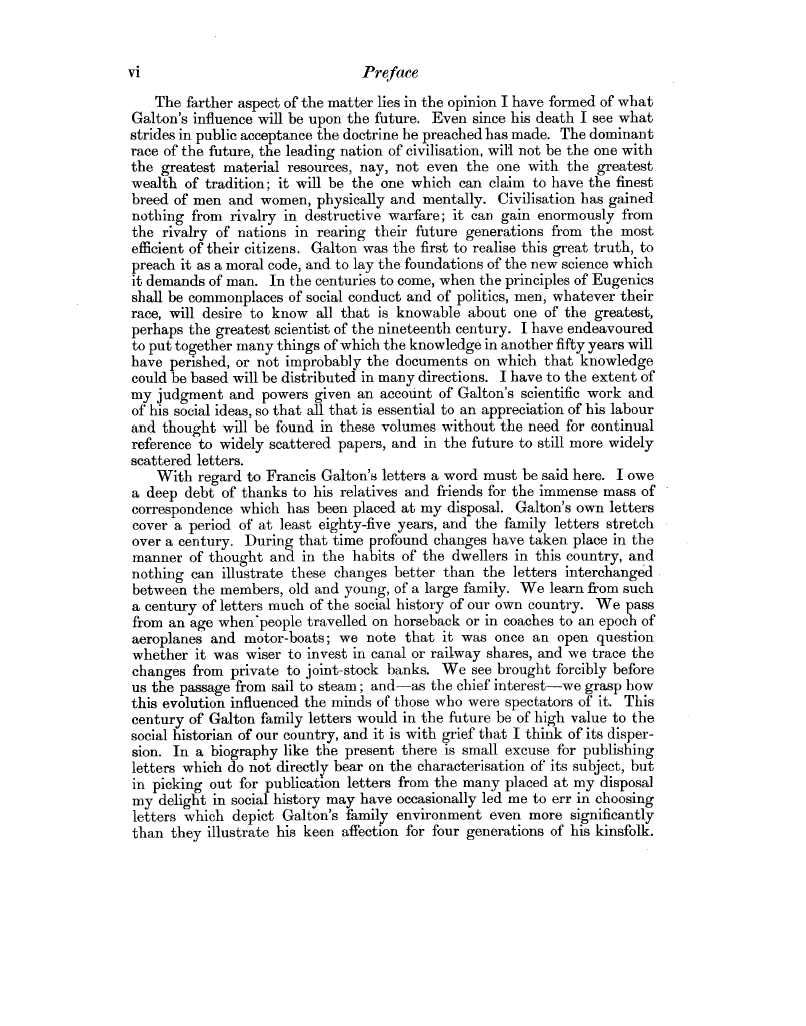vi Pre face
The farther aspect of the matter lies in the opinion I have formed of what Galton's influence will be upon the future. Even since his death I see what strides in public acceptance the doctrine he preached has made. The dominant race of the future, the leading nation of civilisation, will not be the one with the greatest material resources, nay, not even the one with the greatest wealth of tradition; it will be the one which can claim to have the finest breed of men and women, physically and mentally. Civilisation has gained nothing from rivalry in destructive warfare; it can gain enormously from the rivalry of nations in rearing their future generations from the most efficient of their citizens. Galton was the first to realise this great truth, to preach it as a moral code, and to lay the foundations of the new science which it demands of man. In the centuries to come, when the principles of Eugenics shall be commonplaces of social conduct and of politics, men, whatever their race, will desire to know all that is knowable about one of the greatest, perhaps the greatest scientist of the nineteenth century. I have endeavoured to put together many things of which the knowledge in another fifty years will have perished, or not improbably the documents on which that knowledge could be based will be distributed in many directions. I have to the extent of my judgment and powers given an account of Galton's scientific work and of his social ideas, so that all that is essential to an appreciation of his labour and thought will be found in these volumes without the need for continual reference to widely scattered papers, and in the future to still more widely scattered letters.
With regard to Francis Galton's letters a word must be said here. I owe a deep debt of thanks to his relatives and friends for the immense mass of correspondence which has been placed at my disposal. Galton's own letters cover a period of at least eighty-five years, and the family letters stretch over a century. During that time profound changes have taken place in the manner of thought and in the habits of the dwellers in this country, and nothing can illustrate these changes better than the letters interchanged between the members, old and young, of a large family. We learn from such a century of letters much of the social history of our own country. We pass from an age when people travelled on horseback or in coaches to an epoch of aeroplanes and motor-boats; we note that it was once an open question whether it was wiser to invest in canal or railway shares, and we trace the changes from private to joint-stock banks. We see brought forcibly before us the passage from sail to steam; and-as the chief interest-we grasp how this evolution influenced the minds of those who were spectators of it. This century of Galton family letters would in the future be of high value to the social historian of our country, and it is with grief that I think of its dispersion. In a biography like the present there is small excuse for publishing letters which do not directly bear on the characterisation of its subject, but in picking out for publication letters from the many placed at my disposal my delight in social history may have occasionally led me to err in choosing letters which depict Galton's family environment even more significantly than they illustrate his keen affection for four generations of his kinsfolk.
